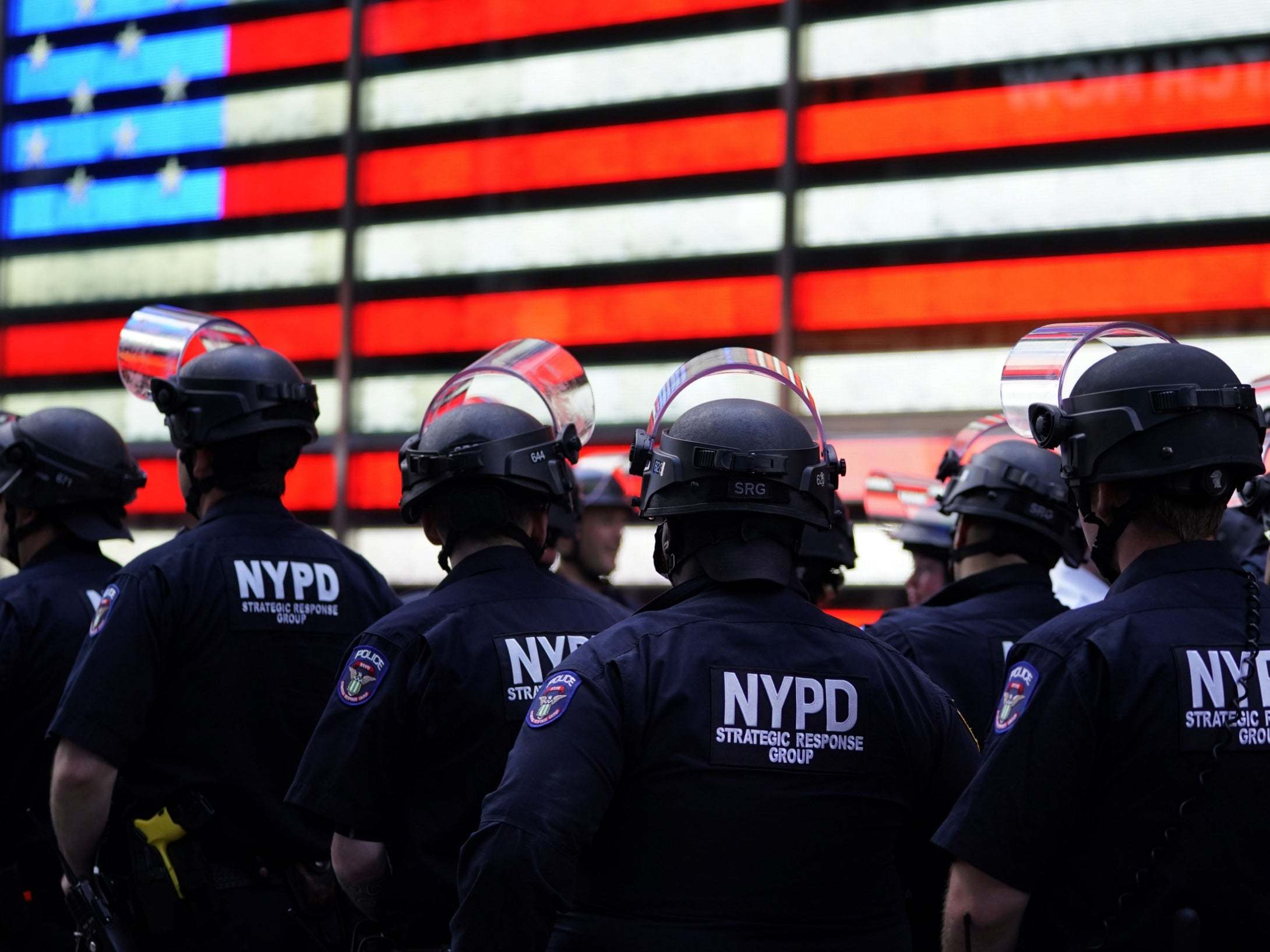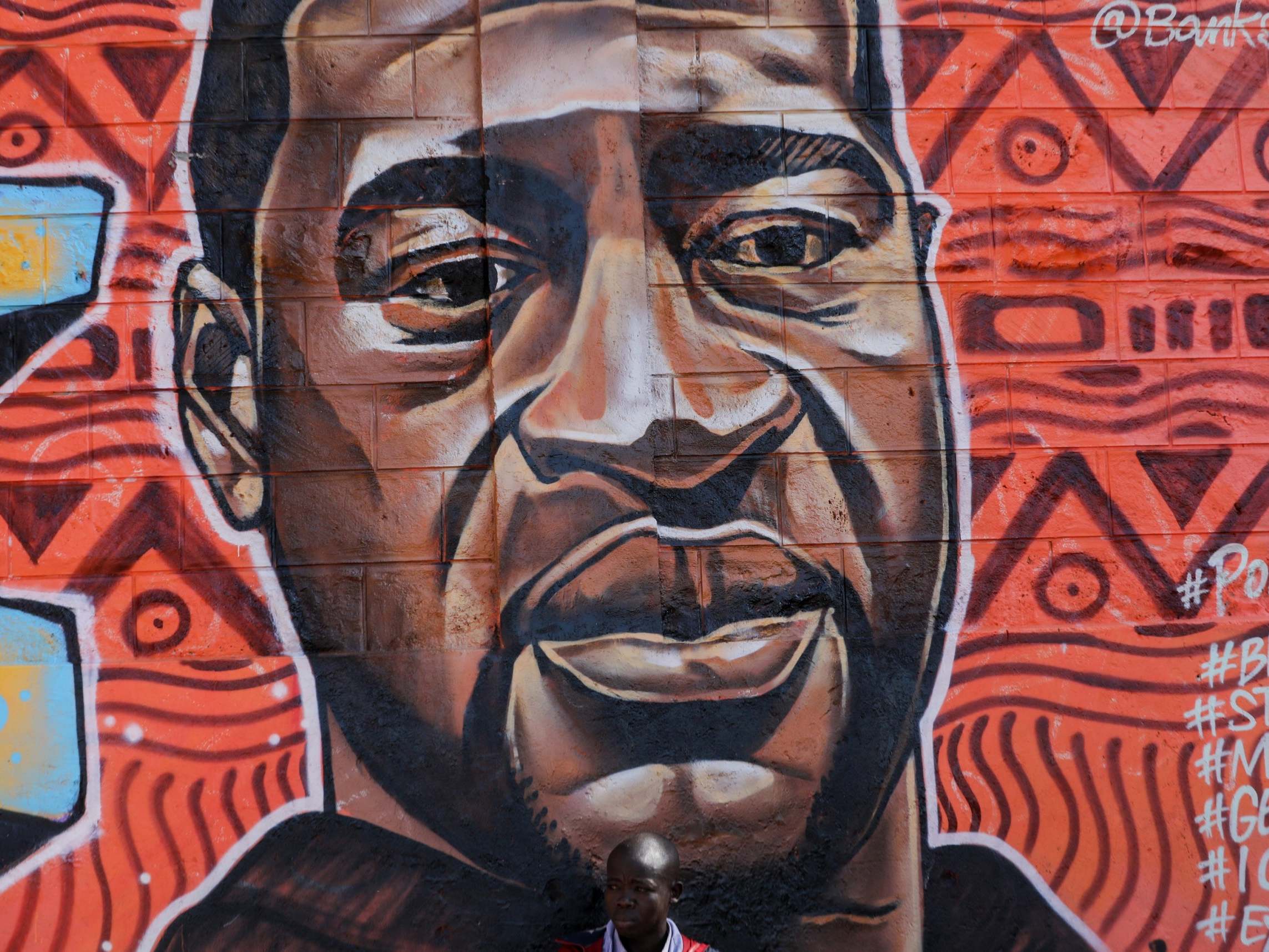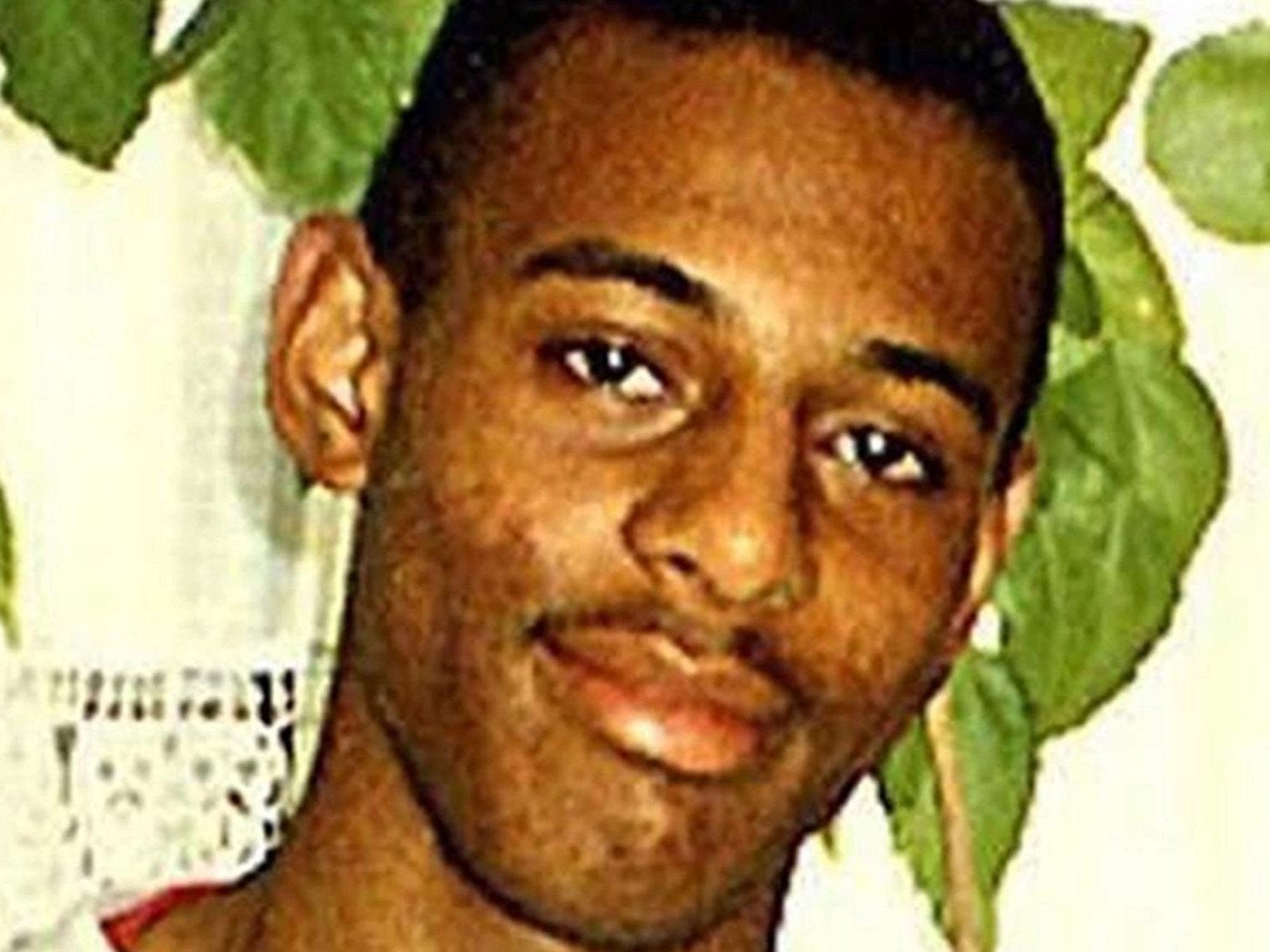‘No justice, no peace’: Why the US must defund its police
George Floyd’s murder shows the failure of liberal attempts to reform a racist system, writes Enis Yucekoralp


In the US, activists and abolitionists have spent years campaigning to end police brutality and the killing of black civilians, but it’s only recently, after George Floyd’s murder by white Minneapolis Police Department officer Derek Chauvin, that defunding, disarming and demilitarising law enforcement has gained widespread traction.
“Decades of police reform efforts have proved that the Minneapolis Police Department cannot be reformed, and will never be accountable for its action,” said council president Lisa Bender, declaring that the council will “begin the process of ending the Minneapolis Police Department and creating a new transformative model for cultivating safety in our city”. Embryonically, things may start to change.
Though it’s only just percolating into the realm of lawmakers and elected US politicians, the concept of defunding the police originally gained currency in 2014 after the protests in Ferguson following the murder of Michael Brown. Proponents state that drastic cuts to hugely inflated state and city law enforcement budgets – plus the demilitarisation and disarming of unaccountable police – is one way to begin eradicating centuries of extrajudicial violence inflicted on black people.
The history of law enforcement in the United States is one of slave patrols, horrific racist violence, colonial policing, white supremacy, and rebellion suppression and surveillance. From the professionalised slave garrisons of the Confederate south in the 1700s to the violent intimidation, extrajudicial killings, and white expansion of the colonist-hired Texas Rangers, the oppressive origin of US policing speaks volumes about the reality of modern law enforcement.
Floyd’s murder and the indefatigable work of activists and Black Lives Matter has added even more urgency to a mission that was already critical. Campaigns such as #8toAbolition demonstrate that defunding is essentially part of a decolonising strategy of abolition that would establish long-term alternatives to the police and the criminal justice system.
“Defunding the police is not simply about withdrawing funding for law enforcement and doing nothing else,” Angela Davis explained to Democracy Now after the first wave of Black Lives Matter protests. “It’s about shifting public funds to new services and new institutions – mental health counsellors, who can respond to people who are in crisis without arms. It’s about shifting funding to education, to housing, to recreation. All of these things help to create security and safety. It’s about learning that safety, safeguarded by violence, is not really safety.” As Davis explains, it as much about refunding as it is about defunding.
Like most radical ideas, the work starts at the grassroots level before it treads the corridors of power. As MPD150, an organisation that campaigns for a police-free Minneapolis, claims: “The people who respond to crises in our community should be the people who are best-equipped to deal with those crises. Rather than strangers armed with guns, who very likely do not live in the neighbourhoods they’re patrolling, we want to create space for more mental health service providers, social workers, victim/survivor advocates, religious leaders, neighbours and friends – all of the people who really make up the fabric of a community – to look out for one another.”
There is also a precedent for the argument that reduced policing could reduce crime. For a few weeks between 2014 and 2015 in New York City, NYPD officers staged a “slowdown” on law enforcement to prove that a reduced force would increase crime. Their experiment had the opposite effect: crime actually decreased by 2,100 complaints.
One of the key issues that prompts the defunding argument is that, despite the majority of police duties involving non-violent calls, recent years have seen many US police departments tool up their ballistic capabilities. A prodigal martial arsenal is not just plainly excessive, it is the dangerously supreme bravado of a police state that shoots almost 1,000 people dead every year. That serried ranks of armed-to-the-teeth officers responded to peaceful Black Lives Matter protests in the US with the unconscionable irony of yet more brutality has led many to finally question whether they really need that much fire or spending power.

Policing in the US has become increasingly militarised through modes such as the Federal 1033 Program, which makes available excess military equipment to law enforcement agencies: a literal “war on crime and drugs”. Methods such as “warrior training” seem to intentionally foster an “us vs them” mentality not helped by the structural whiteness of police union chiefs. Clearly, liberal reform and tick-boxed policy tweaks have done little to effect real social change and racial justice in the US.
The protests over George Floyd’s killing have, however, begun to catalyse direct action in some decision-makers who have finally been prompted to make changes. Alexandria Ocasio-Cortez and others have called for a $1bn reduction of the NYPD’s budget of $6bn per year – New York City mayor Bill de Blasio eventually relented, though he has refused to quantify cuts to the policing budget.
Defunding the police is not simply about withdrawing funding for law enforcement and doing nothing else … It’s about shifting public funds to new services and new institutions … It’s about learning that safety, safeguarded by violence, is not really safety
The mayor of Los Angeles, Eric Garcetti, announced the city would slash $150m from its law enforcement budget, only two days after he initially pushed for a 7 per cent increase. Under previous budgetary proposals, the LAPD would have commanded nearly 54 per cent of the city budget at the expense of other crucial services. He has since rejected Black Lives Matter’s larger 90 per cent defunding proposals for a “People’s Budget”.
Funds spent on policing in the United States have tripled in the past four decades, with the latest figures from 2017 exposing a state and local government expenditure of $155bn. Spending on prisons and policing has continued to rise exponentially and in diametric contrast to critical funding for social services and community projects.
As a globally mobilised movement, Black Lives Matter has inspired the world to protest against racial injustice and it has galvanised a radical anti-racist energy in the UK. Far from a latent force, it has nevertheless been precipitated by the ground gained in the US and the ductile instability of the pandemic.
From the Brixton uprisings of 1981 and 1985 against police harassment, racism and Operation Swamp, to the 1981 Toxteth riots, to London’s riotous outrage in 2011 over the death of Mark Duggan, the UK must also reckon with its history of state violence and police brutality.
Since 2016, the UK arm of Black Lives Matter has been campaigning for justice and organising to oppose anti-blackness, racism and bigotry in Britain. “The UK BLM protests are part of a long history of anti-racist activism that has been responsible for every progressive win we’ve ever seen when it comes to tackling racism,” claims Dr Nadine El-Enany, senior lecturer in law at Birkbeck School of Law and co-director of the Centre for Research on Race and Law.

“We have to remember that this is an anti-colonial movement at its heart. It’s about resistance against white supremacy there and here, a system that subjugates black lives. It’s important to put the protests in this historical narrative because it can help us to resist mainstream, right-wing and elite constructions of protesters as criminal or violent and that they should as Boris Johnson said, ‘face the full force of the law’.
“The sort of direct action we have seen, whether in the form of taking statues down, burning symbols of corporate greed and looting are the sort of resistance that tackles structural racism at its core,” she continues.
Though the law criminalises protestors as vandals, Dr El-Enany rightly states that “the reality is that these protesters are engaging in powerful acts of resistance against centuries of violence and destruction of racialised people, their bodies, their culture, their freedom, their humanity. In terms of the struggle, we risk the demands becoming about the removal of statues, rather than dismantling structural racism,” she underlines. “It’s been refreshing to see demands made around abolition because these are the sorts of radical demands we should be making, abolition of the police, borders and all forms of detention.
“We also have to defend those who have participated in these protests from criminalisation. Using the criminal law against protesters is the state’s way of constructing their actions as anti-democratic, as violations of community, rather than as legitimate political contestation. We saw the painful results of this following the 2011 riots when people involved were tried overnight and given lengthy prison terms. We must be clear in our demand that there should be no prosecutions of protesters.”

With the proxy aim of defending statues to slavers and other racist idols, the recent open violence led by racist far-right groups in Parliament Square shows the extent to which racism has been dog whistled and empowered in Britain. Press, media and government coverage of a white nationalist alliance of bigotry and hooliganism, as against the Black Lives Matter protests in the UK a week earlier, was startling in its propagandised disparity.
Here, it is important to note the sheer scale of the police structure in the US. There are nearly 18,000 police agencies in the United States, while there are only 43 in the UK. The Metropolitan Police have the highest budget of these at around £2.5bn: the next highest expenditure is around £250m.
The people who respond to crises in our community should be the people who are best-equipped to deal with those crises … rather than strangers armed with guns, who very likely do not live in the neighbourhoods they’re patrolling
In order to contextualise the UK protests in relation to the US, it is critical to understand racism and its resistance in both distant and recent British policing history. Liberal historians often point to the London Metropolitan Police’s founding in 1829 by then-home secretary Robert Peel as the first, original policing authority. But at its heart it was designed to manage disorder and protect the wealthy bourgeoise, not to fight crime.
The son of a pro-slavery baronet industrialist, the younger Peel’s Met was spawned out of his own experience managing Britain’s colonial occupation of Ireland and a desire to institute a new apparatus of social control that would mitigate against political insurrection and political riots.
Eventually the London model was adopted across the UK to enforce order and shut down the Chartist movement, the first mass movement led by the working class. By 1838, the archetype of London’s Metropolitan Police was installed in Boston and spread out across the US over the coming decades to New York and Chicago. This was “necessitated” by mass immigration and industrialisation, which had produced waves of worker strikes, ethnic and racial violence, and social upheaval in a viciously expanding country.
In this way, the UK was partially responsible for exporting marshalled policing to the US. Both nations have violated humanity through centuries of slavery and colonial oppression, but their historical evils and particular involvements in racial subjugation are contextually specific. An argument for defunding the police appears as a specific retaliation in the US context where police violence, arsenals, finances and killings are inordinately higher than in the UK. However, a mobilising demand to “defund the police” has also been made at protests in London.

Defunding proposals have finally become a mainstream conversation, but it has been a bloodstained catalysis. Even when extrajudicial killings have been “high-profile” the tragic loss of life has not brought transformative reform. But in the context of coronavirus, Trump and a world seemingly on the precipice of a paradigm shift, George Floyd’s murder seems to have vitalised a generational spark of campaigning.
In supporting American protestors, calls to “defund the police” in the UK have fuelled extant machines of abolition in the UK and inspired new perspectives. Organisations in the UK such as Abolitionist Futures, Account Hackney, StopWatch, 4Front, NetPol, Northern Police Monitoring Project, Green and Black Cross and Police Spies Out of Lives have spent years challenging police injustices and abuses while empowering local communities.
We have to remember that this is an anti-colonial movement at its heart … The sort of direct action we have seen, whether in the form of taking statues down, burning symbols of corporate greed and looting are the sort of resistance that tackles structural racism at its core
According to its exponents on this side of the Atlantic, defunding in Britain might involve policies aimed at disarming police of guns and tasers, curbing budget expansions, eliminating racially profiled stop and search tactics and abolishing units such as the controversially militarised Territorial Support Group. Mass data surveillance would be replaced by investment in community and anti-austerity projects. Britain’s role in the arms and defence industry, its responsibility for the propagation of colonial mechanisms and global policing, Grenfell and the Windrush scandal must also be attended to.
“A project to defund the police in the UK context is a project of divesting from empire,” declares Dr El-Enany, whose book, (B)ordering Britain, explains how law acts as a tool in the persisting legacies of British colonial violence. “To defund the British police is an anti-colonial project in its recognition that police services have always played a crucial role in enforcing Britain’s post-imperial white nationalist borders.
“As the British Empire was defeated, successive British governments introduced immigration controls withdrawing the rights of racialised commonwealth and colony citizens to enter the British mainland over the course of the 1960s, ’70s and ’80s. Via immigration and nationality law the British empire created itself anew as a nation state. British police forces have long been tasked with brutally enforcing Britain’s post-imperial white nationalist boundaries. Young black people have long been demonised, constructed as criminals, and police violence and harassment have been enacted with impunity in racialised neighbourhoods.”
The pivotal Macpherson report echoed similar findings when it concluded that the Metropolitan Police was “institutionally racist”. It followed the murder of Stephen Lawrence in 1999, where its collective policing failure was diagnosed through its discrimination through “unwitting prejudice, ignorance, thoughtlessness and racist stereotyping”. Speaking in 2012, one of its panel members, Dr Richard Stone, told The Independent: “The police really haven’t moved on when it comes to racism at all. After all that effort that everybody put in, somehow nothing has really changed.”
That Neville Lawrence believes the police are still institutionally racist, 21 years after the murder of his son, is a damning indictment of police trust and the disproportionate use of stop and search tactics on black people in Britain. Despite Met Police commissioner Cressida Dick’s strained apologia, to suggest that London’s police officers are free from racial discrimination is an affront to the lived experience of millions.

Leon Patterson, Joy Gardner, the unlawful killing of Christopher Alder in police custody, Azelle Rodney to Sean Rigg, Olaseni Lewis, Kingsley Burrell, Sheku Bayoh, Edson da Costa, Julian Cole, Sarah Reed, Nuno Cardoso, Rashan Charles, Darren Cumberbatch: an appalling catalogue of black lives lost at the point of contact with the state violence of institutional racism in the UK.
The United Families and Friends Campaign continues to work tirelessly to support the families of black and ethnic minority families inordinately affected by state violence and a broken criminal justice system. In May, Simeon Francis was pronounced dead in his cell after becoming “unresponsive”. His tragic death speaks to the valued existence of the Deathscapes project, which I was made aware of by award-winning journalist Rebecca Omonira-Oyekanmi. As an interdisciplinary research initiative, it “maps the sites and distributions of custodial deaths in locations such as police cells, prisons and immigration detention centres, working across the settler states of Australia, the US and Canada, as well as the UK/EU”. The ultimate goal of Deathscapes is to end the horror of deaths in custody.
This focus on the criminal punishment system is unsurprising considering the centuries of imperialism, slavery and colonialism that made Britain what it is today. In fact, a report by Inquest claimed that “people of black, Asian and minority ethnicity die disproportionately as a result of use of force or restraint by the police, raising serious questions of institutional racism as a contributory factor in their deaths”.
Even just this recent history of violence and structural racism explains the deep mistrust and resentment of the police in the UK and the radical impetus to dismantle structural racism in Britain. In relation to the campaign to defund the police in the US, the sins of British imperialism and institutional racism in the UK make its policing far from innocent. Fantasist quarters of the British public claim that the US is a unique case, that “police don’t do that over here”, or that the UK is a post-racial society: this false consciousness is itself the product of racial ignorance, white privilege and government revisionism.
A global public are continually told that the police exist in order to keep them safe from crime, harm and danger. Yet police brutality, extrajudicial killings of black people, and a lack of police accountability all speak counter to that pledge: “to protect and to serve” the interests of white elites. Common, liberal understanding states that the more you invest in the police the safer you will be, but as Alex S Vitale explains in The End of Policing, the reality is that the overarching purpose of the police is to maintain a society of discipline, to enforce racial stratification and to operate as a tool of social control, which facilitates the exploitation and oppression of disempowered people.
The history of policing is the history of violence exacted against marginalised communities – against black people, people of colour, queer and trans communities, sex workers, those with disabilities, activists and political agents. The murder of George Floyd and the fight for justice by Black Lives Matter demonstrate the failure of a liberal pipe dream to reform a racist police system. Clearly, they are inveterately beyond reform.
In the UK and the US, it is vital that non-police solutions are brought in to deal with the societal issues of healthcare, housing and employment in ways which prioritise public safety and black lives rather than criminalising the enforced deprivation of communities. Rather than the punitive ideology of the criminal justice system, defunding would entail divesting policing funds and redirecting them to processes and projects that would actually prevent crime rather than simply performing militarised injustice and racial profiling.
To defund is to take the first steps towards dismantling structural racism, the institutional killings of black people and to redirecting reparations towards communities subjected to racialised trauma for centuries. “Law and order” is out of order: it must be sentenced to obsolescence.
Join our commenting forum
Join thought-provoking conversations, follow other Independent readers and see their replies
Comments